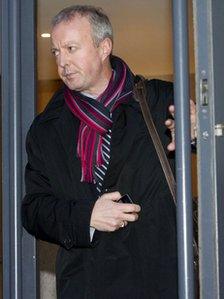Duff and Phelps 'agreed' to cap Rangers fees at £500,000
- Published

Craig Whyte discussed Rangers pending administration with Duff and Phelps
Rangers' administrators Duff and Phelps agreed with owner Craig Whyte to cap their fees at £500,000 two days before they were appointed.
Emails obtained by BBC Scotland reveal the firm also agreed to try to minimise the time spent in administration.
Duff and Phelps' fees and charges now stand at more than £5.5m.
The firm said that the capped fee was envisaged for an outcome which never materialised and that the BBC has got its figures wrong.
Duff and Phelps were appointed as administrators for Rangers after the club failed to pay tax to HMRC of up to £15m.
They had been involved with Craig Whyte since before his takeover of Rangers in May 2011.
HMRC moved to appoint their own administrators but agreed, at the Court of Session in Edinburgh, to the appointment of Mr Whyte's choice.
In an <link> <caption>email dated 11 February 2012</caption> <url href="http://www.bbc.co.uk/news/uk-scotland-glasgow-west-18268349" platform="highweb"/> </link> , with a subject heading Project William, Mr Whyte tells David Grier, a senior partner from Duff and Phelps, that he wants "all costs pinned down and no unpleasant surprises later on".
'Curve balls'
The Rangers owner stresses that administration costs should be capped at "a maximum" of £500,000 and that the process "should be short" and "preferably in hours".
He acknowledges, however, that "we may be hit with some curve balls".
Mr Whyte states the capped fee should include all work by Duff and Phelps in meeting requirements by the Scottish Football Association to have accounts for the granting of a Uefa licence by 31 March.

Mr Grier said a fees cap was possible subject to an extra time cost payment
The Rangers owner also says in the email that the administration could "play out in a couple of different ways".
One option was a "straightforward" with a company voluntary arrangement (CVA) agreed with HMRC.
The other would involve a "pre-pack" sale of the "business and assets" and a "CVA of Oldco to keep league membership" and satisfy Uefa rules.
In the email, Mr Whyte states: "We will have no choice but to go down this route if HMRC don't agree a CVA during the moratorium".
Mr Whyte tells Mr Grier that he would be more comfortable with two rather than three joint administrators and would "like to speak to David (Whitehouse) and Paul (Clark) to make sure that they're comfortable with the fact that we might end up with HMRC being hostile".
Mr Grier responded to Mr Whyte in an <link> <caption>email dated 12 February 2012</caption> <url href="http://www.bbc.co.uk/news/uk-scotland-glasgow-west-18268349" platform="highweb"/> </link> .
In his reply, the Duff and Phelps senior partner agreed to try and keep the administration process as short as possible and proposes to cap fees at £500,000 with the caveat that the firm can discuss "an additional payment in respect of our total time costs".
Mr Grier also agrees with Mr Whyte on the possible different scenarios in administration, the problems which may arise, and the need for the club to retain its licence and satisfy Uefa rules.
'Muck raking'
He signs off by saying: "We trust that this update and our earlier conversation meets with your approval, and demonstrates our understanding of the sensitive nature of this administration."
In a statement from Duff and Phelps, joint administrator Paul Clark said: "This is another pathetic muck raking exercise by the BBC which completely misrepresents our position.
"From day one of the administration, it was abundantly clear the club was in a major insolvency situation that was going to last for a significant period of time.
"This was evident from our discussions with HMRC that day and we stated at our very first press conference, attended by the BBC, that Craig Whyte's estimates for a quick resolution were optimistic."
Mr Clark said that it was "completely misleading and inaccurate" for the BBC "to suggest we gave a guarantee of fee level and guarantee of time the administration would last".
"The emails in question were preceded by a letter sent on 10 February 2012 which made reference to a £500,000 fee in relation to a specific possible outcome which did not materialise," he said.
"The BBC has also got its figures wrong when stating our fees are now more than 10 times this amount.
"As stated yesterday, all fees are subject to approval by creditors and are in keeping with the best practice guidelines from insolvency practitioners bodies."
Mr Clark said he and Mr Whitehouse had "a statutory duty to look after the interests of creditors and keep the business going, which we have managed to do under extremely challenging circumstances".
He added: "It is absurd for the BBC to take these emails, written prior to administration and based on a specific possible outcome, as evidence of any wrongdoing on our part."
Secured creditor
On Tuesday, Duff and Phelps issued an offer to creditors for a CVA.
Documents published showed the firm had accrued operating charges and legal fees to date of more than £5.5m.
Duff and Phelps also hold secure creditor status, meaning the firm could, under certain conditions, be the only creditor to be paid.
All other unsecured creditors, including HMRC, Ticketus, football clubs and public bodies, would only be entitled to whatever is left over from a CVA pot or sale of assets in liquidation.
Last week, a BBC Scotland documentary - Rangers: The Men Who Sold the Jerseys - raised questions about a possible conflict of interest for Duff and Phelps as administrators.
Mr Grier had said he was unaware of a deal for £24.4m between Rangers and finance firm Ticketus until August 2011.
The BBC programme showed emails that he knew a deal with Ticketus was under way in April, before Mr Whyte's takeover.
Insolvency expert Roger Isaacs told the programme that if the emails demonstrated what they appeared to, it would amount to "one of the starkest conflicts of interest I've ever seen".
Duff & Phelps denied the claims and accused the BBC of distorting the facts.
In a reply for the firm, Mr Clark said: "There is a world of difference between knowing that Ticketus was a potential source of working capital funding for the club… and knowing that funding from ticket sales had been effectively used to purchase the club."